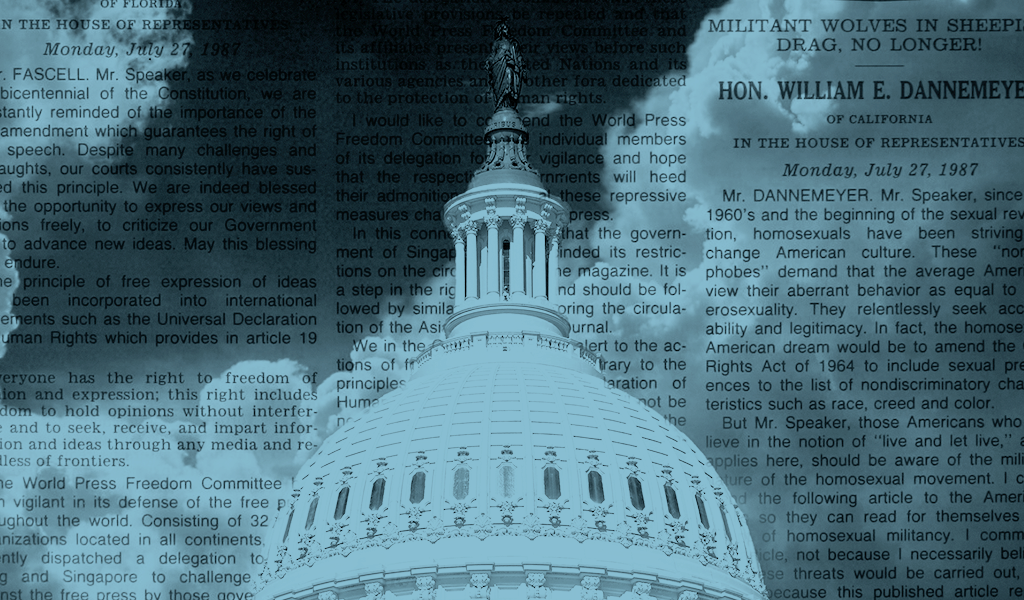
“We shall sodomize your sons” read California Representative William Dannemeyer to the US Congress on July 27, 1987. “We will stab you in your cowardly hearts and defile your dead, puny bodies … We shall conquer the world …” Dannemeyer was reading from the hidden agenda he discovered in a gay periodical. The article by Michael Swift was entitled “Gay Revolutionary.” What Dannemeyer failed to communicate in his attempt to expose the vileness of homosexuality, however, was that Swift’s article was actually an absurdist satirical piece, not a serious manifesto. But Dannemeyer’s damage was now done.
Such political vitriol has dangerous effects. Coining the oft used phrase “gay agenda” that was used to spread fallacies about the LGBT community for decades to come, Dannemeyer’s speech provided many Americans the justification they sought to fight back the (non-existent) “gay revolutionaries” attacking the country. There’s no wonder the LGBT community faces substantially higher rates of bullying, suicide, and in 2014 became the target of more hate crimes than any other minority group in America.
 Creating narratives is no doubt an important tool in American politics. Some narratives are founded in reality while others are fictionalized. As an artist and writer, one of my most cherished pursuits is truth. It may seem ironic that a writer like me utilizes fiction to pursue truth, but the difference between my narrative and Dannemeyer’s is that my fiction is used to help share the beauty of reality.
Creating narratives is no doubt an important tool in American politics. Some narratives are founded in reality while others are fictionalized. As an artist and writer, one of my most cherished pursuits is truth. It may seem ironic that a writer like me utilizes fiction to pursue truth, but the difference between my narrative and Dannemeyer’s is that my fiction is used to help share the beauty of reality.
I am developing a musical I’ve written called Question 1. At its core, the show explores the tragic effects of bullying, particularly the brutal cycle of the oppressed all too often becoming the oppressor. The audience follows the devolution of Freddy, a bullied child turned self-loathing adolescent turned closeted politician. When he finds himself amidst Maine’s 2009 same-sex marriage debate, his acrimoniousness towards the LGBT community capitalizes on the us-vs-them tactic we see all too often in today’s politics. Never did I imagine the absurdist satire I began writing in my musical two years ago would somehow manifest itself into today’s actual headlines.
Perhaps there’s irony in Teddy Roosevelt’s coining of the phrase “bully pulpit” which was originally based on the obsolete definition of “bully,” meaning “good, first-rate, or wonderful.” Despite today’s discordantly disparate definition of the word “bully,” Roosevelt’s phrase ironically captures the drastically different, yet accurate style in which political positions of authority (or nominees to such positions) use their power to spread their message today. In fact, a new poll commissioned by the Tyler Clementi Foundation found that:
 53% of the more than 1400 registered voters questioned said “yes” when asked if they “believe the polarizing language being used in this presidential election is spilling over to young people and creating more meanness.”
53% of the more than 1400 registered voters questioned said “yes” when asked if they “believe the polarizing language being used in this presidential election is spilling over to young people and creating more meanness.”
A political cynic might dwell on the dismal devolution of the bully pulpit’s etymological connotation, but the truth is that if a meaning has changed once, it can change again. It is up to upstanders, whether they be individuals or organizations like TCF, to say that the days of bullying must come to an end. It is up to us to challenge ourselves and humanity to rise above contempt in all its forms–to strive for the most beautiful thoughts and selves possible. If you want to write a musical about it, then go for it! If spontaneously bursting into song isn’t your thing, no worries! Go volunteer, offer support, respectfully meet hateful speech with beautiful wisdom, and if you’ve not already done so, buy your ticket to the TCF Upstander Legacy Celebration right now!
And on November 8th, spread messages of respect, not contempt. With your help, we can share the narrative of truth, beauty, and kindness eliminating hate. With your help, perhaps we can return the meaning of America’s bully pulpit back to Roosevelt’s “wonderful pulpit.”
 Chris Reza is a writer, Broadway musician (Fun Home), and a proud supporter of the Tyler Clement Foundation. For more information, visit his site, learn about Question 1, or follow him on Facebook and Twitter.
Chris Reza is a writer, Broadway musician (Fun Home), and a proud supporter of the Tyler Clement Foundation. For more information, visit his site, learn about Question 1, or follow him on Facebook and Twitter.
Photographs of Chris Reza by Kevin Chavez
The views or experiences expressed are solely those of the contributor or interview subject and do not represent the views of the Tyler Clementi Foundation, its staff or board. If you have any questions or concerns regarding the material, please contact the Tyler Clementi Foundation, and we appreciate your support and commitment to end bullying starting on #Day1.
